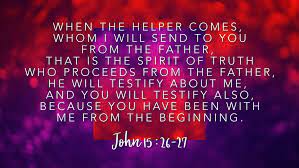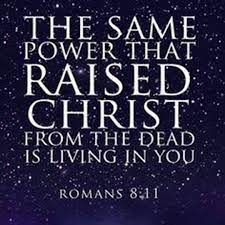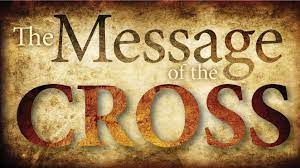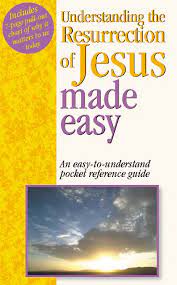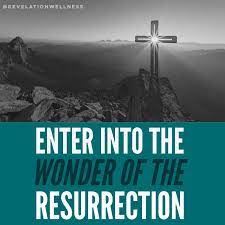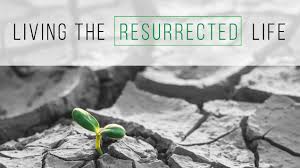
Resurrected Living
Since Easter, we have embarked on the journey to gain a greater understanding of the resurrection. More specifically, we have focused on its reality, its wonder, and its power in our everyday life.
Hopefully, what we have come to realize is that our “everyday life” can be lived more fully through the same power that raised Jesus from the dead (Eph. 1:19-20). This power we learned is through the Holy Spirit that also dwells in us. “But if the Spirit of Him who raised Jesus from the dead dwells in you, He (God) who raised Christ from the dead will also give life to your mortal bodies through His Spirit who dwells in you.” (Rom. 8:11)
Living the resurrected life can be realized as we incorporate three (3) key principles to our understanding. Resurrected life is: (1) transformational, (2) intentional, and (3) relational.
Resurrected life is transformational.
When we accept Jesus as our Savior, our life begins to change. How does change occur? By emptying ourselves of our agendas and replacing them with God’s plan. We move from a “self-directed life” to a “Christ-directed life”.
Paul explains this transformation to the church in Galatia (Gal. 2:19-20, NLT):
I have been crucified with Christ. I myself no longer live, but Christ lives in me. So I live my life in this earthly body by trusting in the Son of God, who loved me and gave himself for me.
Our transformation is the ongoing work of the Holy Spirit. It is our responsibility to cooperate with His instructions. Each day we empty ourselves through our acts of obedience and by loving one another. We then let the Holy Spirit fill that space in our heart (the filling of the Holy Spirit) and follow His lead.
As we empty ourselves, there is more room for the Holy Spirit to occupy. In the filling, we begin to look and act more like Jesus. We become conformed to His image (Rom. 8:29).
Resurrected life is intentional.
It begins with acceptance of resurrection as a “new way” of life. When we accepted Jesus as our Savior, we did more than buy the “fire insurance”. We spiritually “died with Christ on the cross”. Part of that dying includes ending our “preoccupation” and “attraction” to the things of this world (1 John 2:15-16).
Paul explains this intentional behavior to the church at Colosse (Col. 3:1-5, NLT):
Since you have been raised to new life with Christ, set your sights on the realities of heaven, where Christ sits at God’s right hand in the place of honor and power. Let heaven fill your thoughts. Do not think only about things down here on earth. For you died when Christ died, and your real life is hidden with Christ in God. And when Christ, who is your real life, is revealed to the whole world, you will share in all his glory. So put to death the sinful, earthly things lurking within you. Have nothing to do with sexual sin, impurity, lust, and shameful desires. Don’t be greedy for the good things of this life, for that is idolatry.
Living intentionally is a process that doesn’t happen overnight. That’s why we must be thoughtful and mindful in our pursuit of the resurrected life (Rom. 12:1-2). This process should include disciplines which help us daily renew our hearts and mind, i.e., prayer, study of God’s Word, meditation.
Resurrected life is relational.
The Apostle John captures Jesus’ final hours with His disciples in the Upper Room Discourse (John 13-17). Jesus knew that in less than 24 hours He would be on the cross. After spending 3 ½ years in intimate relationship with His Disciples, Jesus would leave them on their own. However, the Disciples would not be alone (John 15:7-15).
In chapter 15, Jesus takes time to stress the importance of relationship and preparation for the indwelling of the Holy Spirit. The Disciples’ success would depend on their ability to stay in relationship with or abide in Him. This “abiding” would be accomplished through the indwelling of the Holy Spirit.
Abiding describes the “dwelling as it were within Jesus and to be continually operative in Him by His divine influence and energy.”[1] This relationship is like that which Jesus experienced with the Father (John 10:30; 14:31; 15:10). The Disciple’s power would come through developing a similar relationship with the Holy Spirit.
Our success in living the resurrected life is also dependent on our abiding relationship with Jesus (vv.1-11) and our demonstration of love for our fellowman (vv. 12-17).
Resurrected life in the 21st century
Resurrection is more than a one-time event. While the resurrection of Jesus is a documented, historic occurrence that took place over 2,000 years ago, it is much more. Its power continues to exert an unprecedented and recurring influence in the hearts and lives of believers around the world. Even today, when the Gospel is shared, people believe and become new creatures in Christ (2 Cor. 5:17).
For believers, resurrected life is a time for transformation as we experience a new relationship with God the Father, Jesus our Lord, and the Holy Spirit. Resurrected life is possible as we intentionally pursue God’s plan and will for His kingdom. Resurrected life is an experience, from which, we will never be the same.
Why is this important for us today? Because with Christ’s resurrection, we have an opportunity to “new life” that is found by our faith in Jesus Christ. It is in resurrected life that victorious living begins. We can depend on God’s power and Jesus’ victory beginning on Resurrection Sunday AND extending throughout all of eternity.
[1] Thayer’s Greek Lexicon




